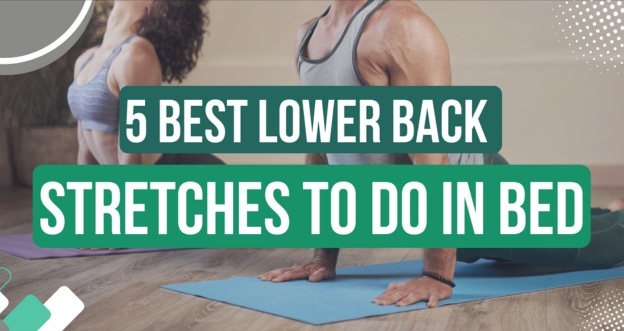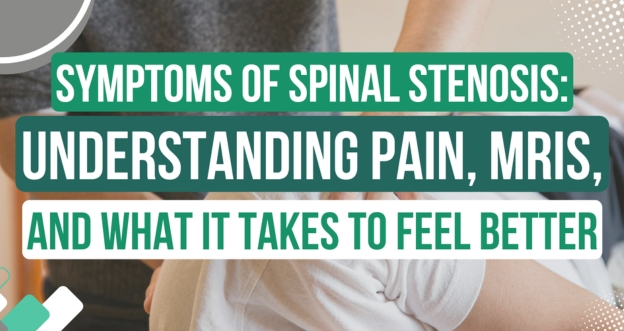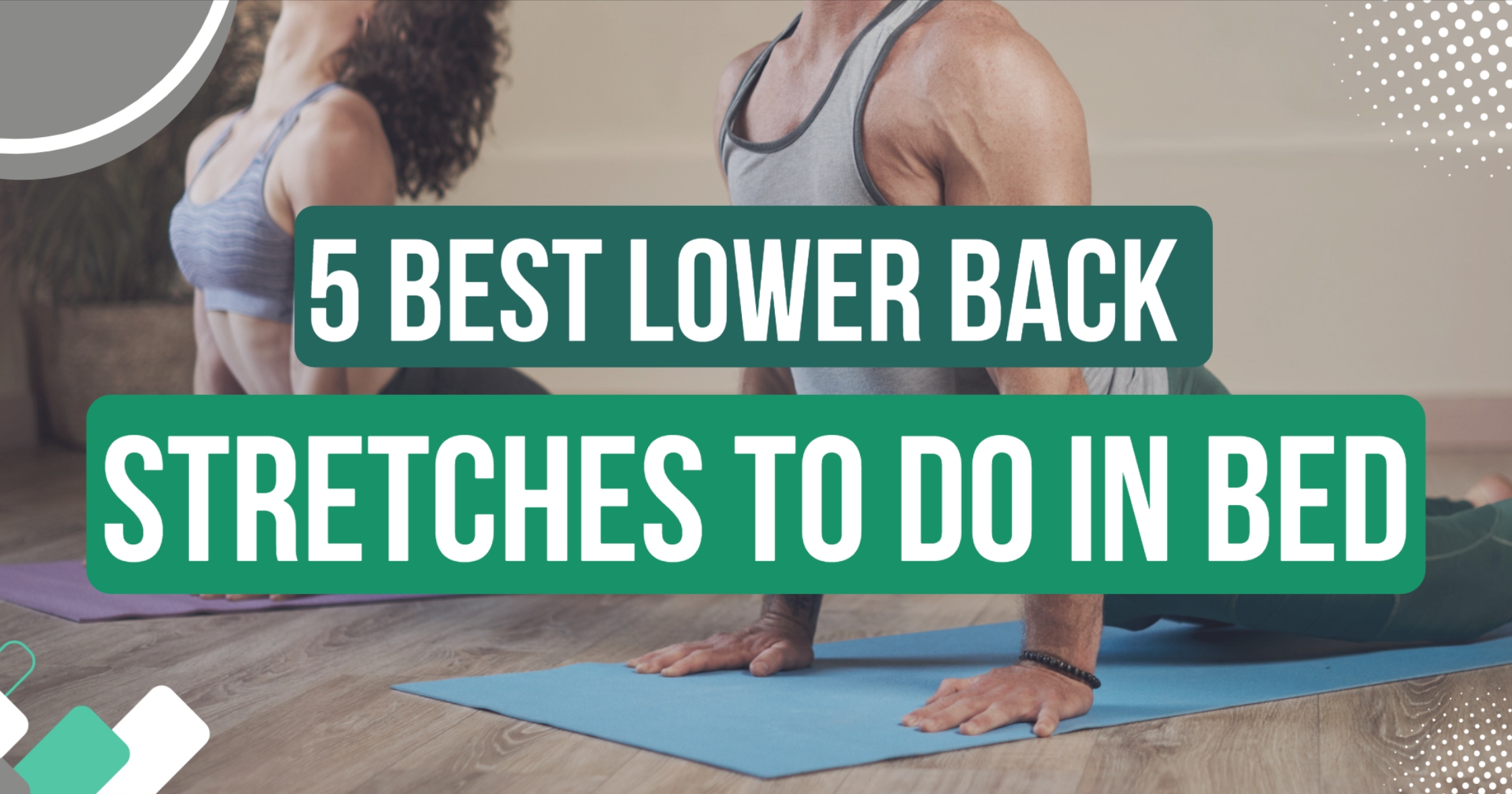
5 Best Lower Back Stretches to Do in Bed
I've often give these stretches you can do right in bed to find relief, loosen tight muscles, and improve your back mobility.
Based on clinical experience treating hundreds of patients with back pain, these stretches have consistently proven to be the most beneficial, comfortable, and convenient.
If you have a history of back pain, whether from stenosis or disc issues, consider my book, which includes over 50 exercises not only to stretch your back but also to improve its resilience and overall well-being.
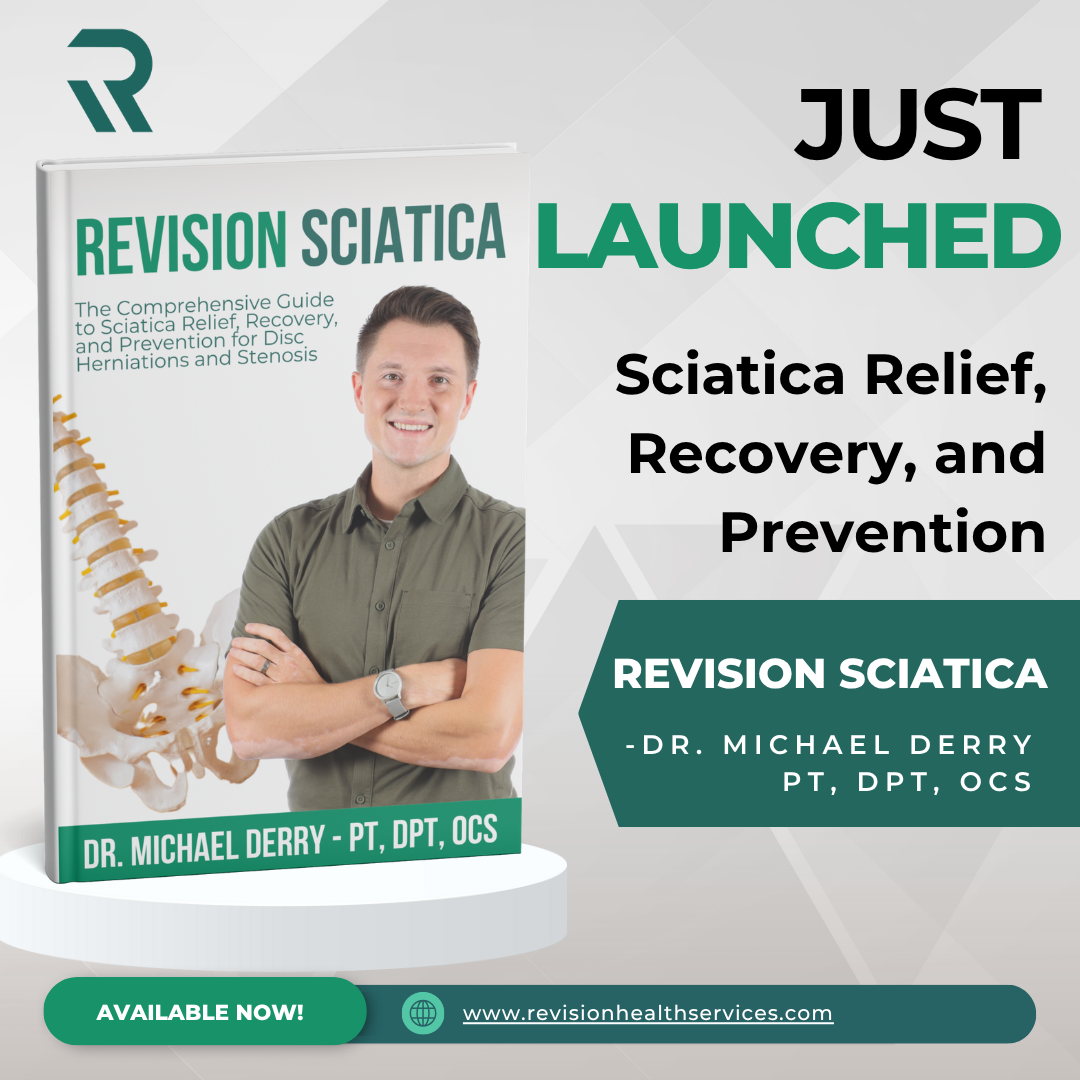
If you're unsure what is causing your back pain or discomfort, you can take this short quiz I've created to help you find out.
5 Lower Back Stretches You Can Do in Bed
Follow these instructions to learn exactly how to stretch your back in bed safely. Let's explore each stretch in detail, with proper form and modifications for your comfort. Regular stretching and physical activity have been shown to effectively manage chronic low back pain. In fact, a comprehensive 2021 meta-analysis found that home-based exercise programs, particularly those that included trunk, pelvic, and leg stretching, were highly effective in reducing pain intensity and improving function.
Don’t feel like reading? Check out this video which I review each stretch in detail.
1. Pelvic Tilting: Foundation for Back Mobility
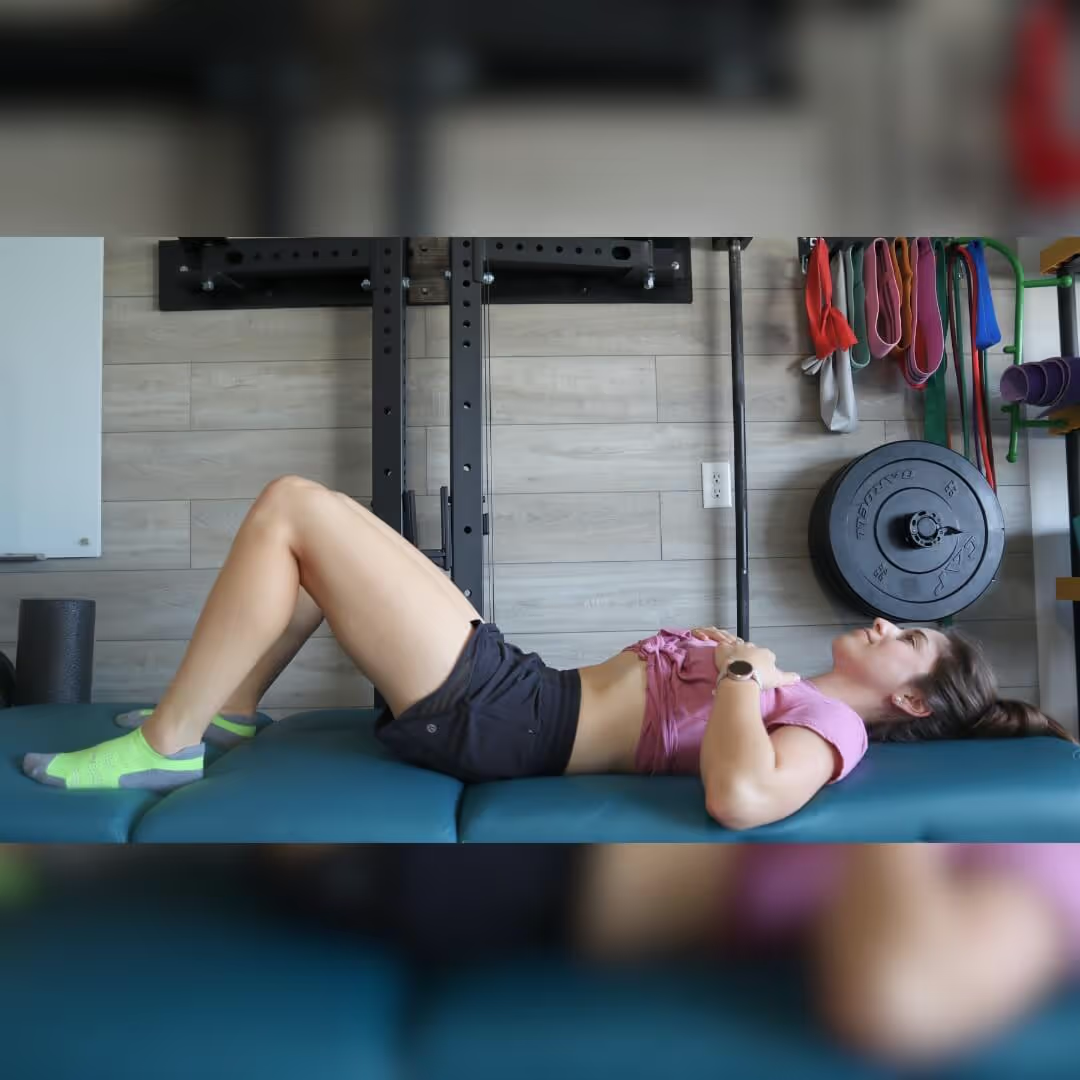
Clinical Benefits: Pelvic tilts activate core muscles while gently mobilizing the lumbar spine, helping reduce morning stiffness.
Starting Position:
- Lie on your back with knees bent
- Maintain neutral spine position
- Keep feet flat on the bed
Technique:
- Slowly rock your pelvis backward (posterior tilt) as if tucking your tail
- Then rock forward (anterior tilt), creating a small arch in your lower back
- Move smoothly between these positions
- Perform 10-15 repetitions
2. Bent Knee Trunk Rotations: Gentle Spinal Mobility

Clinical Benefits: This movement helps improve spinal rotation while maintaining stability through the core.
Technique:
- Lie on your back, knees bent
- Find your comfortable foot position - wider or narrower as needed
- Gently rock knees side to side
- Aim for 30 repetitions
- Stay within a pain-free range
3. Hamstring Stretch: Addressing Posterior Chain
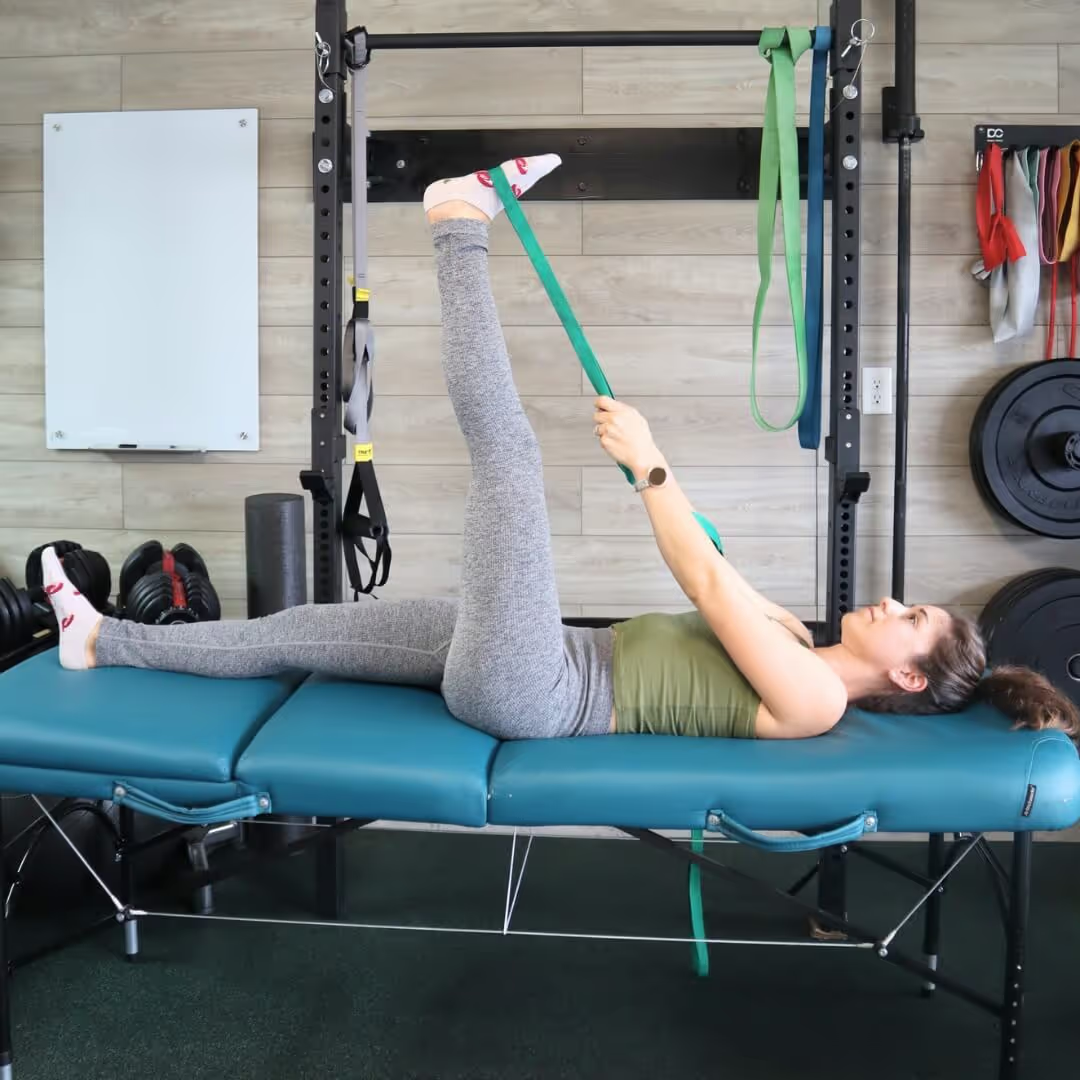
Clinical Benefits: Research demonstrates that maintaining spinal flexibility through stretches like this can significantly impact chronic low back pain management. This stretch helps maintain proper muscle length and reduces stress on the lower back.
Technique:
- Extend one leg while bringing the other toward the ceiling
- Use hands or a strap for support
- Feel the stretch in your posterior thigh
- Option to hold static or perform gentle oscillations
- Remember: Morning stiffness is normal - start gently
You can purchase straps and other equipment to use at your house, here.
4. Knees to Chest: Classic Pain Relief
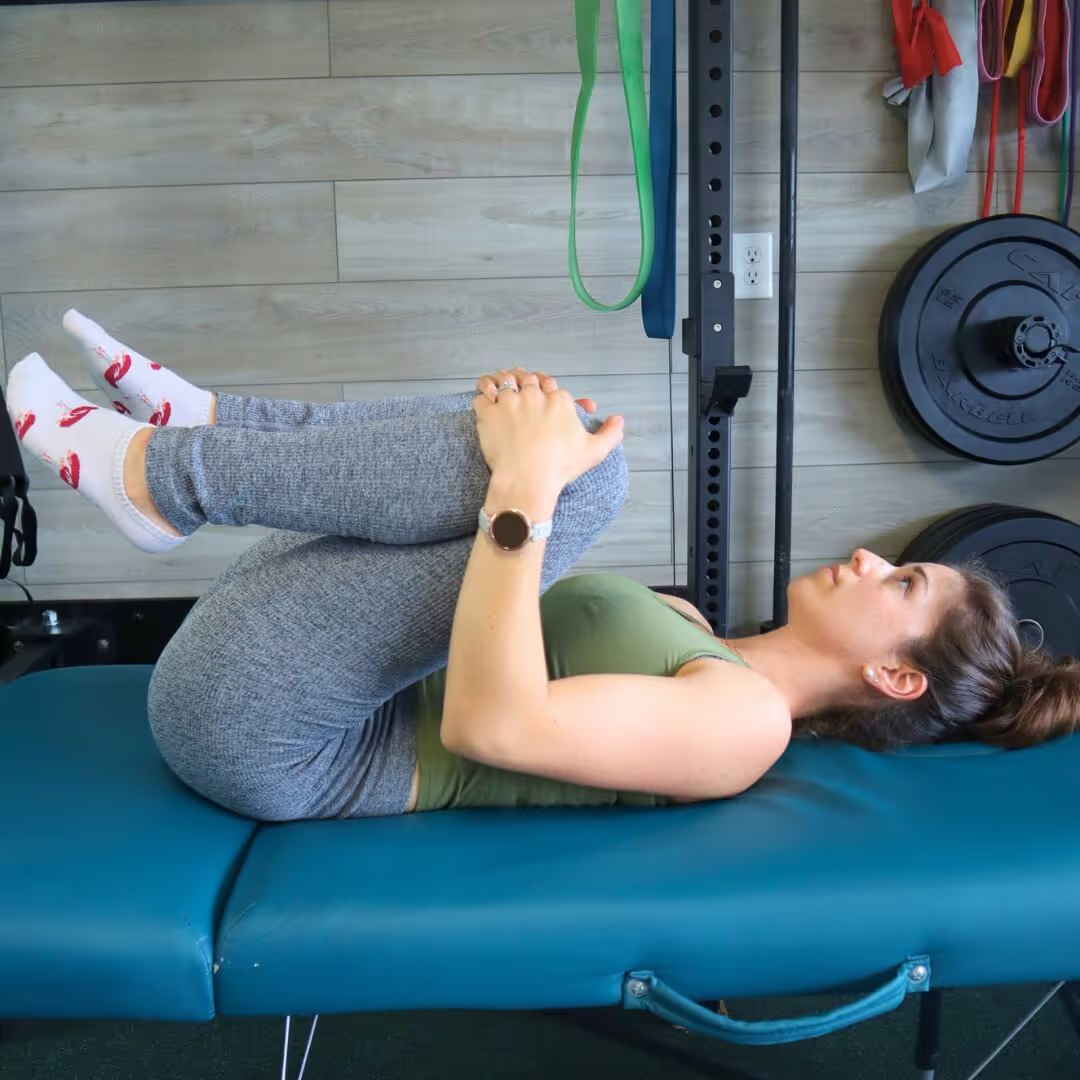
Clinical Benefits: This position helps decompress the spine while stretching lower back muscles.
Technique:
- Bring both knees toward your chest
- Create a gentle "hugging" motion
- Experiment with knee position - slight outward rotation may feel better
- Alternate between gentle pulling and relaxing
5. Thomas Stretch: Hip Flexor Focus
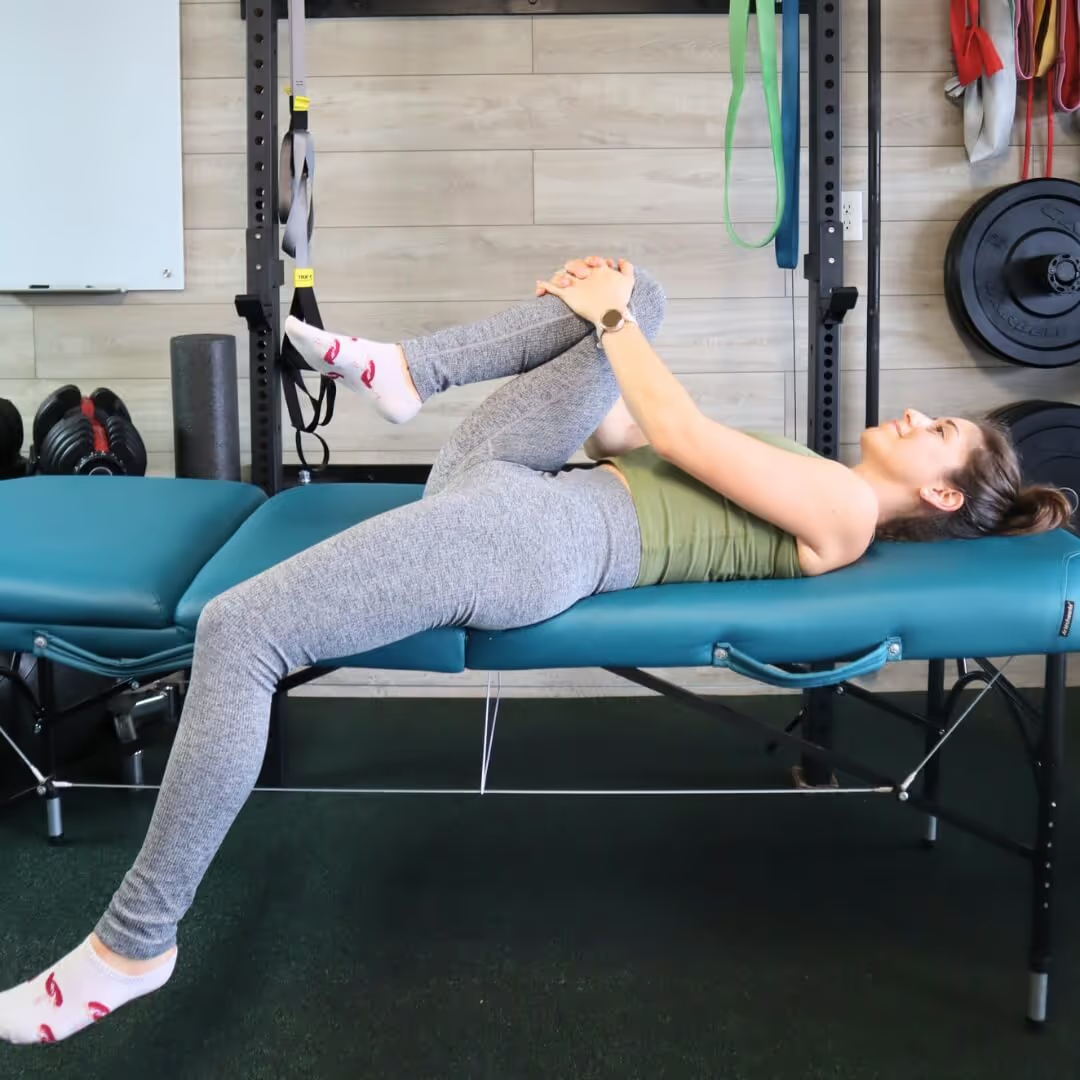
Clinical Benefits: Addresses hip flexor tightness, which research links to lower back pain.
Technique:
- Position yourself near edge of bed
- Let one leg hang while bringing opposite knee to chest
- Feel stretch in front hip/thigh of hanging leg
- Optional: Use strap around ankle for deeper stretch
Bonus Morning Mobility Exercises In Bed
These additional exercises are particularly effective for morning stiffness and can be incorporated into your routine as needed. I would do these after stretching.
Cat-Camel Stretch
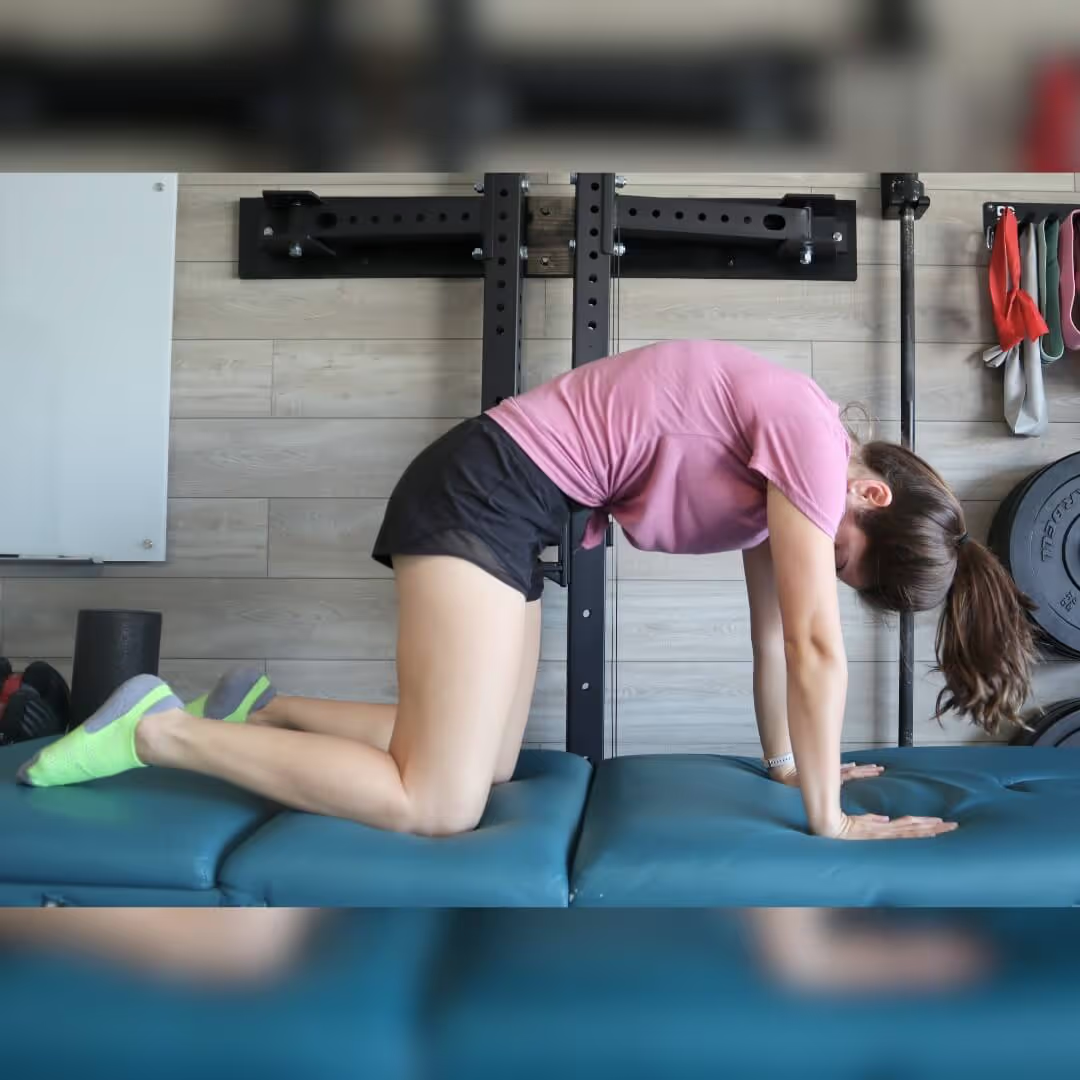
Clinical Benefits: Improves spinal mobility, reduces stiffness, and promotes better coordination between hips and lower back.
Technique:
- Begin on hands and knees with wrists under shoulders and knees under hips
- Place pillow under knees if extra support is needed
- Tilt pelvis backward, arching spine upward (like a cat stretch)
- Slowly tilt pelvis forward, letting back dip and tailbone lift
- Move gently between these two positions to increase flexibility
- Keep motion small at first; avoid ranges that cause pain
Note: Mild discomfort is normal, but stop if pain radiates into the hips or legs. Extension-based stretches may be a better starting point if symptoms occur.
Prayer Stretch
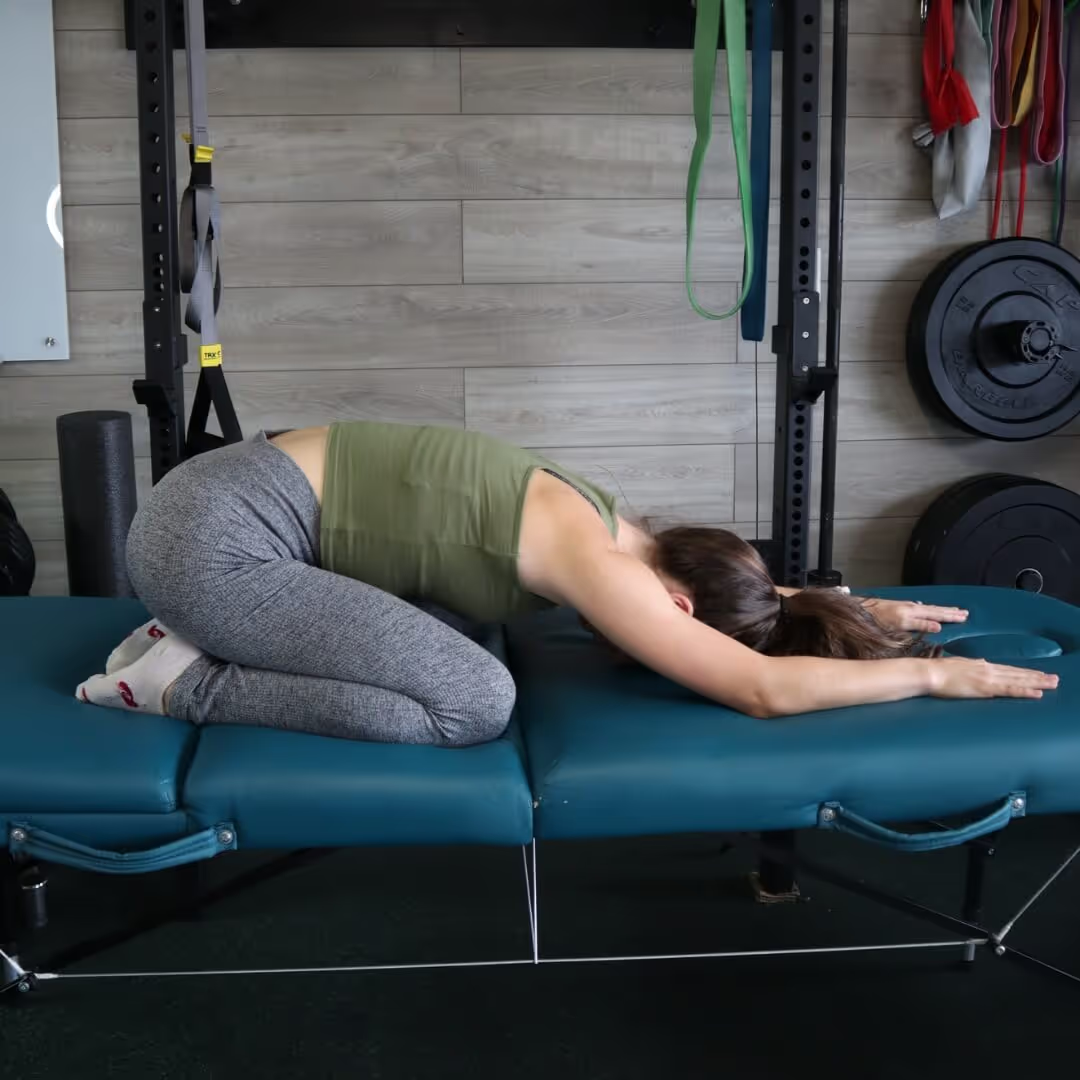
Clinical Benefits: Encourages spinal flexion, improves mobility, and helps relieve tension in the lower back.
Technique:
- Begin on hands and knees with wrists under shoulders and knees under hips
- Tilt pelvis underneath you and gently engage abs
- Arch spine upward, then slowly rock hips back toward heels
- Keep hands planted in original position as you move
- Hold for one slow breath before returning to start
The Impact of Consistent Morning Stretching
Starting your day with gentle stretches can significantly reduce the time it takes for your body to overcome morning stiffness. A regular morning routine can:
- Reduce pain and improve function before starting your day
- Prime your body for movement
- Improve mood and reduce stress
- Create a positive start to your day
Getting a win by completing 10-15 minutes of self-improvement can have a lasting effect on the rest of your day.
Your Back is Stiff in The Morning for 2 Reasons
There are two main reasons for morning back stiffness:
- Lack of Movement: During sleep, you typically maintain one or two positions for 7-9 hours. This extended period without movement can lead to muscle stiffness and joint immobility.
- Fluid Build up: Your spinal discs absorb water during the night to maintain their cushioning function for the day ahead. While this height change is minimal, it can make an already sensitive nervous system more reactive in the morning.
Your joints work a lot like door hinges—they move best when they’re kept active and well-lubricated. Every time you move, your body naturally produces lubrication that helps ease stiffness and discomfort. The stretches in this article are designed to keep your joints moving smoothly so you can start the day feeling loose and energized. I’ve also created a specialized morning routine that not only lubricates your joints but also stretches your muscles and nourishes your nerves. You can grab it for just $7 to give your back even more support and relief.
Summary
This blog highlights five evidence-based stretches you can do right in bed to ease morning stiffness, improve mobility, and reduce back pain. Backed by both clinical research and personal stories—including the author’s 99-year-old grandmother who swears by daily stretching—it emphasizes the power of consistency in maintaining a healthy spine. With simple, safe movements like pelvic tilts, knee-to-chest, and hamstring stretches, a short morning routine can set the tone for less pain, better function, and an energized start to the day.
I've often give these stretches you can do right in bed to find relief, loosen tight muscles, and improve your back mobility.
Based on clinical experience treating hundreds of patients with back pain, these stretches have consistently proven to be the most beneficial, comfortable, and convenient.
If you have a history of back pain, whether from stenosis or disc issues, consider my book, which includes over 50 exercises not only to stretch your back but also to improve its resilience and overall well-being.

If you're unsure what is causing your back pain or discomfort, you can take this short quiz I've created to help you find out.
5 Lower Back Stretches You Can Do in Bed
Follow these instructions to learn exactly how to stretch your back in bed safely. Let's explore each stretch in detail, with proper form and modifications for your comfort. Regular stretching and physical activity have been shown to effectively manage chronic low back pain. In fact, a comprehensive 2021 meta-analysis found that home-based exercise programs, particularly those that included trunk, pelvic, and leg stretching, were highly effective in reducing pain intensity and improving function.
Don’t feel like reading? Check out this video which I review each stretch in detail.
1. Pelvic Tilting: Foundation for Back Mobility

Clinical Benefits: Pelvic tilts activate core muscles while gently mobilizing the lumbar spine, helping reduce morning stiffness.
Starting Position:
- Lie on your back with knees bent
- Maintain neutral spine position
- Keep feet flat on the bed
Technique:
- Slowly rock your pelvis backward (posterior tilt) as if tucking your tail
- Then rock forward (anterior tilt), creating a small arch in your lower back
- Move smoothly between these positions
- Perform 10-15 repetitions
2. Bent Knee Trunk Rotations: Gentle Spinal Mobility

Clinical Benefits: This movement helps improve spinal rotation while maintaining stability through the core.
Technique:
- Lie on your back, knees bent
- Find your comfortable foot position - wider or narrower as needed
- Gently rock knees side to side
- Aim for 30 repetitions
- Stay within a pain-free range
3. Hamstring Stretch: Addressing Posterior Chain

Clinical Benefits: Research demonstrates that maintaining spinal flexibility through stretches like this can significantly impact chronic low back pain management. This stretch helps maintain proper muscle length and reduces stress on the lower back.
Technique:
- Extend one leg while bringing the other toward the ceiling
- Use hands or a strap for support
- Feel the stretch in your posterior thigh
- Option to hold static or perform gentle oscillations
- Remember: Morning stiffness is normal - start gently
You can purchase straps and other equipment to use at your house, here.
4. Knees to Chest: Classic Pain Relief

Clinical Benefits: This position helps decompress the spine while stretching lower back muscles.
Technique:
- Bring both knees toward your chest
- Create a gentle "hugging" motion
- Experiment with knee position - slight outward rotation may feel better
- Alternate between gentle pulling and relaxing
5. Thomas Stretch: Hip Flexor Focus

Clinical Benefits: Addresses hip flexor tightness, which research links to lower back pain.
Technique:
- Position yourself near edge of bed
- Let one leg hang while bringing opposite knee to chest
- Feel stretch in front hip/thigh of hanging leg
- Optional: Use strap around ankle for deeper stretch
Bonus Morning Mobility Exercises In Bed
These additional exercises are particularly effective for morning stiffness and can be incorporated into your routine as needed. I would do these after stretching.
Cat-Camel Stretch

Clinical Benefits: Improves spinal mobility, reduces stiffness, and promotes better coordination between hips and lower back.
Technique:
- Begin on hands and knees with wrists under shoulders and knees under hips
- Place pillow under knees if extra support is needed
- Tilt pelvis backward, arching spine upward (like a cat stretch)
- Slowly tilt pelvis forward, letting back dip and tailbone lift
- Move gently between these two positions to increase flexibility
- Keep motion small at first; avoid ranges that cause pain
Note: Mild discomfort is normal, but stop if pain radiates into the hips or legs. Extension-based stretches may be a better starting point if symptoms occur.
Prayer Stretch

Clinical Benefits: Encourages spinal flexion, improves mobility, and helps relieve tension in the lower back.
Technique:
- Begin on hands and knees with wrists under shoulders and knees under hips
- Tilt pelvis underneath you and gently engage abs
- Arch spine upward, then slowly rock hips back toward heels
- Keep hands planted in original position as you move
- Hold for one slow breath before returning to start
The Impact of Consistent Morning Stretching
Starting your day with gentle stretches can significantly reduce the time it takes for your body to overcome morning stiffness. A regular morning routine can:
- Reduce pain and improve function before starting your day
- Prime your body for movement
- Improve mood and reduce stress
- Create a positive start to your day
Getting a win by completing 10-15 minutes of self-improvement can have a lasting effect on the rest of your day.
Your Back is Stiff in The Morning for 2 Reasons
There are two main reasons for morning back stiffness:
- Lack of Movement: During sleep, you typically maintain one or two positions for 7-9 hours. This extended period without movement can lead to muscle stiffness and joint immobility.
- Fluid Build up: Your spinal discs absorb water during the night to maintain their cushioning function for the day ahead. While this height change is minimal, it can make an already sensitive nervous system more reactive in the morning.
Your joints work a lot like door hinges—they move best when they’re kept active and well-lubricated. Every time you move, your body naturally produces lubrication that helps ease stiffness and discomfort. The stretches in this article are designed to keep your joints moving smoothly so you can start the day feeling loose and energized. I’ve also created a specialized morning routine that not only lubricates your joints but also stretches your muscles and nourishes your nerves. You can grab it for just $7 to give your back even more support and relief.
Summary
This blog highlights five evidence-based stretches you can do right in bed to ease morning stiffness, improve mobility, and reduce back pain. Backed by both clinical research and personal stories—including the author’s 99-year-old grandmother who swears by daily stretching—it emphasizes the power of consistency in maintaining a healthy spine. With simple, safe movements like pelvic tilts, knee-to-chest, and hamstring stretches, a short morning routine can set the tone for less pain, better function, and an energized start to the day.
